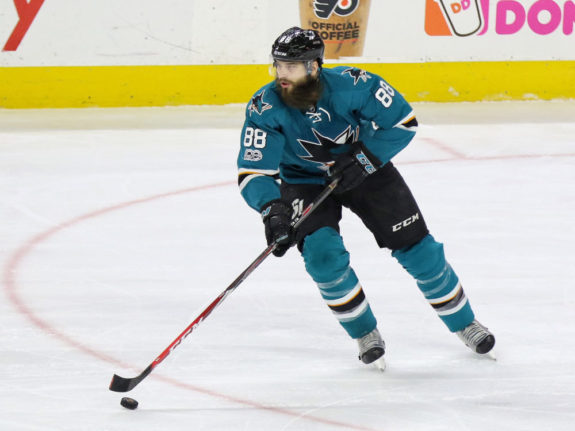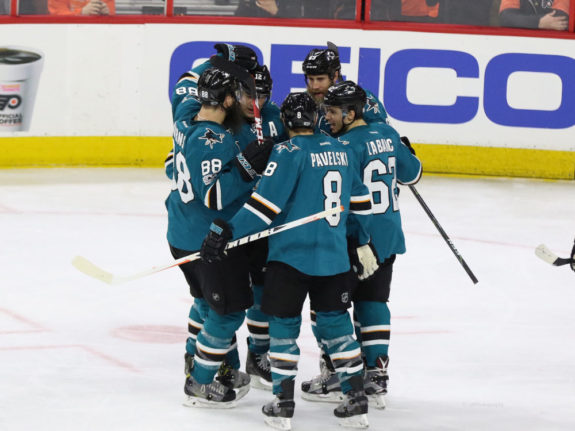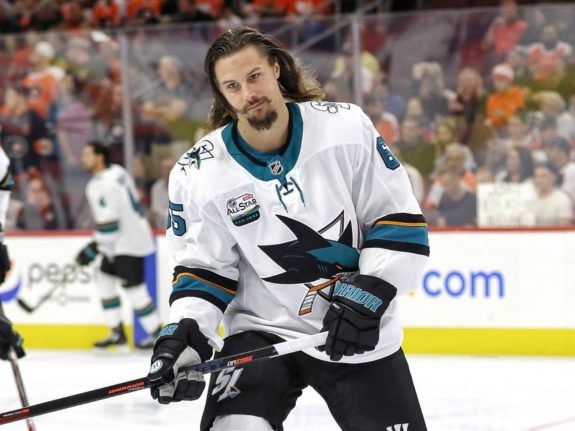The San Jose Sharks acquired Brent Burns in the 2011 offseason. At the time, Burns was coming off a 46-point season with the Minnesota Wild. He rotated between playing defense and forward, which was unusual, but made sense due to his massive 6-foot-5 frame. When he transitioned his game to San Jose, he transitioned to a full-time defenseman, where he has remained to this day.
Related: Revisiting the Brent Burns Trade
Burns has been an essential member of the Sharks since he dawned the teal in the first season. While he has never managed to win a Stanley Cup, he has provided consistent defensive structure to his team, even winning a Norris Trophy in 2017. However, with a new era of Sharks approaching in the midst of a retool, the time has come to contemplate Burns’ future with the organization.
The Cap Conundrum
The Sharks and the salary cap have never been fans of one another. Doug Wilson, general manager of the Sharks, has handed out many contracts that go on for a long time. Some of the most notorious contracts he has handed out include Martin Jones’ six-year, $5.75 million average annual value (AAV) contract, and Marc-Edouard Vlasic’s eight-year, $7 million AAV contract. Jones’ contract was bought out in the 2021 offseason, and Vlasic’s contract is currently halfway completed.
Burns is no exception to this contract frenzy. He signed an eight-year, $8 million AAV contract on Nov. 22, 2016. However, Burns has stood apart from most players who received long contracts under Wilson in his continued ability to produce. He currently has 31 points in 49 games during a season where the Sharks have been less-than-stellar. While his production may not be worth his current contract’s price tag, he is still playing like someone who wants to win.

The Sharks are not in desperate need of cap space, but that will not be the case forever. If the retool is successful, the Sharks will be back in contention within a few years. Unfortunately, there is no guarantee that Burns is still playing to the same level he is now by that point in time. Contracts like Vlasic’s have already become practically unmovable; the last thing the Sharks need is another difficult-to-move contract.
The Youth Movement
The Sharks’ roster is growing younger each season. Because the window has mostly closed on the Sharks’ odds to win the Stanley Cup, they have been trying a more youthful approach recently. If the retool is successful, many of these young players will be taking slots on the Sharks roster currently occupied by their older players. Unfortunately, this will leave no room for players like Burns.

The biggest issue with trading Burns is that he is an older player with a big contract. However, with younger players joining the Sharks more and more, a time will come where he is no longer an essential member of the defensive core. In fact, his plus-minus rating has been steadily declining each year. Burns is beginning to become more and more offensively focused. A young, promising defenseman is likely to take his place sooner rather than later.
Trading Burns soon would allow him to join a team looking to buff their defensive scoring in hopes of a deep playoff run. There are plenty of teams in the NHL who could use a veteran defenseman that can score points. Burns may not be fitting into the young player base on the Sharks, but he could absolutely find a home on the blue line of a playoff team who can afford him. Besides, for better or for worse, the Sharks already have an offensive-based defenseman who they will be unable to move anytime soon: Erik Karlsson.
Erik Karlsson’s Role
Karlsson, much like Jones and Vlasic, signed a massive contract at the end of the 2019-20 season. He is currently in the third year of an eight-year, $11.5 million AAV contract. This season, Karlsson has put up 26 points in 33 games and has a plus-minus rating of minus-4.

In many ways, Karlsson is a more expensive, younger version of Burns. He scores points at a relatively similar pace to Burns, and he often struggles to find his place defensively. Karlsson has always been valued based on his speed and ability to produce offensively. While Burns has occasionally been able to keep up with him point-wise, the speed difference between these two players has always set them apart.
Karlsson has largely replaced Burns in the role of “highly-paid offensive defenseman.” Despite Burns’ larger frame, he is becoming overshadowed by Karlsson in San Jose, especially since Karlsson has largely returned to form this year. While Burns has been around longer and provides excellent leadership, he is beginning to become expendable.
Related: Karlsson Capitalizing on Injury-Free Season
There are far too many upsides to trading Burns this offseason to ignore. He is still highly respected for his leadership capabilities, and he has a massive reputation. In some scenarios, a player’s reputation and locker room presence mean more than their point production, and the Sharks could capitalize on that before his stats outweigh his value.
The Sharks will be fine without Burns. Karlsson will mentor the young defensemen who join the team, and the other veterans will fill the leadership void. However, this trade will hurt Sharks fans in the same way it hurt to see Joe Pavelski and Joe Thornton leave. The glory days are gone, and if the Sharks want to win a cup, faces that were a part of the team on the doorstep of the Stanley Cup will have to leave. However, nostalgia can not halt progress. If the Sharks are serious about contending, it might be time to see Burns begin a new chapter somewhere else.